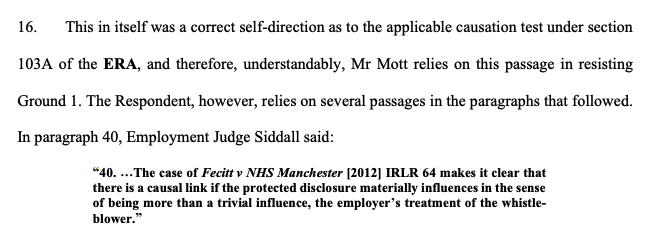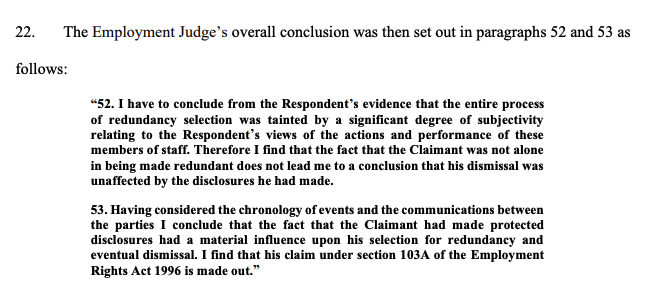
1/ A v Burke & Hare: A #ukemplaw case not about the employment status of serial killers & grave robbers, but about anonymity orders & strippers.
bailii.org/uk/cases/UKEAT…
bailii.org/uk/cases/UKEAT…
2/ A worked as a stripper at B&H lap dancing club whilst studying IT. She brought a holiday pay claim for £1800 under the WTR. At a PH, she applied for an anonymity order. She no longer works as a stripper, doesn't intend to in the future & hopes for a career in IT or finance.
3/ In apply for the order, A raised concerns about potential abuse on her identity being linked to the sex industry, that some family & friends were ignorant of her stripping history & that her mental health would suffer if identified in judgments. 

4/ The ET refused to make an anonymity order, unsympathetically (& judgementally) finding that A should have foreseen stripping may harm career prospects & should have known that raising a claim in a public tribunal would lead to her name being on a public judgment. 

5/ The EJ wasn't persuaded of the mental health risk nor of any risk of abuse/exploitation if identified by name in a judgment, noting both the lack of any history of sexual violence but also that A had willingly undertaken the risk of abuse/violence when working as a stripper. 

6/ On appeal, A argued the EJ failed to take account of damage to A's honour & reputation under Art 8, ought not to have taken into account against A her choice to work as a stripper, & that it was perverse to find a public interest in a judgment bearing her name.
7/ Lord Summers started by emphasising the importance of open justice, & the need under Art 6(2) to show necessity before there could be a derogation from those principles. He noted also ET r50(2)'s requirement for ETs to give full weight to the principle of open justice. 



8/ The EAT wasn't sympathetic to arguments about damage to honour & reputation, holding that such is an ordinary concomitant of litigation & didn't outweigh open justice. 

9/ Lord Summers also wasn't persuaded about the risk of abuse or assault upon identification, noting the Internet is a big place in which only a tiny % of ET & EAT judgments attract publicity. He wasn't persuaded her name would become known just because it was in an ET judgment.
10/ Whilst recognising the possibility friends currently unaware would learn of her stripper past, the EAT wasn't convinced that would have much impact on her dignity & reputation, especially if she's young (I'm not sure whether this is a compliment or insult to today's youth!) 

11/ In short, whilst the EAT recognised A sought to conceal her true identity when working as a stripper, it wasn't satisfied that A's Art 8 right to privacy trumped the important principles of open justice. Her appeal was thus dismissed.
12/ Alas A was clear that she would rather withdraw her claim than have her identity revealed. She asked the EAT to maintain her anonymity in its judgment in those circumstances.
13/ Lord Summers acceded to this request, noting that the interest in open justice is at its strongest when it restricts reporting of the merits of the case, but that it had less weight at the stage of merely identifying whether an anonymity order should be made. 

14/The EAT rejection of the appeal was probably right on the law, though it's unfortunate to my mind if fear of being identified denies a person the opportunity to bring a claim for money duly owed. Is open justice really that important in this context?
• • •
Missing some Tweet in this thread? You can try to
force a refresh














